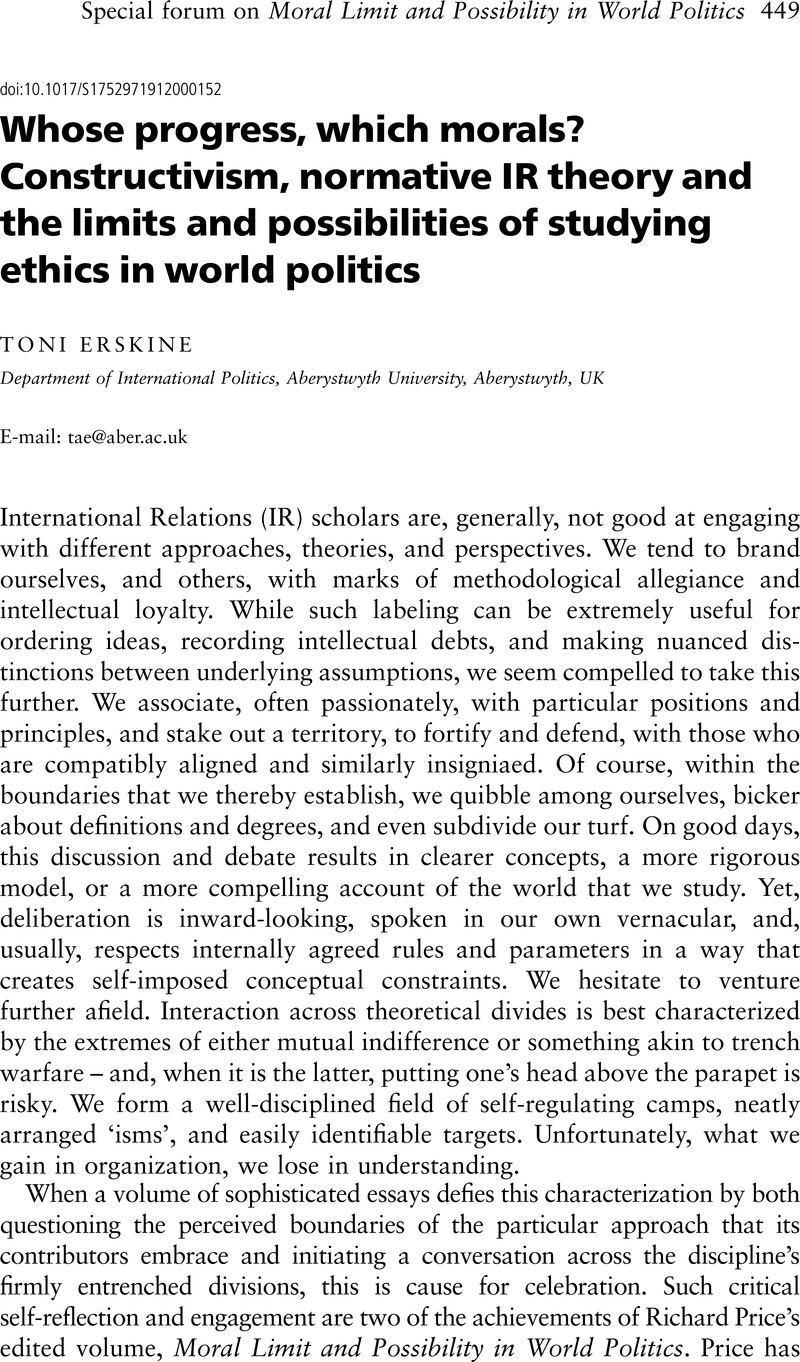Crossref Citations
This article has been cited by the following publications. This list is generated based on data provided by Crossref.
Dufek, Pavel
2013.
Why strong moral cosmopolitanism requires a world-state.
International Theory,
Vol. 5,
Issue. 2,
p.
177.
Lang, Anthony F.
2014.
Constructing States, Constructing the International.
International Studies Review,
Vol. 16,
Issue. 2,
p.
314.
Devellennes, Charles
2014.
Utility contra utilitarianism: Holbach’s international ethics.
Journal of International Political Theory,
Vol. 10,
Issue. 2,
p.
188.
Brigg, Morgan
Curth‐Bibb, Jodie
Strakosch, Elizabeth
and
Weber, Martin
2015.
Knowing and Doing Between the Academic and Policy Worlds in Development Assistance.
Journal of International Development,
Vol. 27,
Issue. 7,
p.
1294.
Hintz, Lisel
2016.
“Take it outside!” National identity contestation in the foreign policy arena.
European Journal of International Relations,
Vol. 22,
Issue. 2,
p.
335.
Ralph, Jason
and
Gifkins, Jess
2017.
The purpose of United Nations Security Council practice: Contesting competence claims in the normative context created by the Responsibility to Protect.
European Journal of International Relations,
Vol. 23,
Issue. 3,
p.
630.
Stullerova, Kamila
2017.
Embracing ontological doubt: The role of ‘reality’ in political realism.
Journal of International Political Theory,
Vol. 13,
Issue. 1,
p.
59.
Marks, Michael P.
2018.
Revisiting Metaphors in International Relations Theory.
p.
193.
Ralph, Jason
2018.
What Should Be Done? Pragmatic Constructivist Ethics and the Responsibility to Protect.
International Organization,
Vol. 72,
Issue. 1,
p.
173.
Karp, David Jason
2020.
What is the responsibility to respect human rights? Reconsidering the ‘respect, protect, and fulfill’ framework.
International Theory,
Vol. 12,
Issue. 1,
p.
83.
Hofius, Maren
2021.
Perspectives on International Political Theory in Europe.
p.
87.
Erskine, Toni
2021.
Still avoiding Armageddon: neglected antecedents and the future promise of Australian normative IR theory.
Australian Journal of International Affairs,
Vol. 75,
Issue. 6,
p.
619.
Donovan, Outi
2021.
Norm Contestation and Pragmatic Ethics: Evaluating the Rebuilding Norm in Libya.
Journal of Global Security Studies,
Vol. 6,
Issue. 4,
Han, Yuna
and
Rosenberg, Sophie T
2021.
Claiming Equality: The African Union's Contestation of the Anti-Impunity Norm.
International Studies Review,
Vol. 23,
Issue. 3,
p.
726.
Agius, Christine
2022.
Handbook of Military Sciences.
p.
1.
Wiener, Antje
2022.
Societal multiplicity for international relations: Engaging societal interaction in building global governance from below.
Cooperation and Conflict,
Vol. 57,
Issue. 3,
p.
348.
Orchard, Phil
and
Wiener, Antje
2023.
Norm Research in Theory and Practice.
SSRN Electronic Journal,
Wiener, Antje
and
Orchard, Phil
2023.
Social in Practice, Contested in Principle: Future Norm Research.
SSRN Electronic Journal,
Lerner, Adam B.
2024.
Global injustice and the production of ontological insecurity.
European Journal of International Relations,
Vol. 30,
Issue. 3,
p.
595.
Gholiagha, Sassan
and
Sienknecht, Mitja
2024.
Between (ir)responsibility and (in)appropriateness: Conceptualizing norm-related state behaviour in the Russian war against Ukraine.
Global Constitutionalism,
Vol. 13,
Issue. 2,
p.
370.


